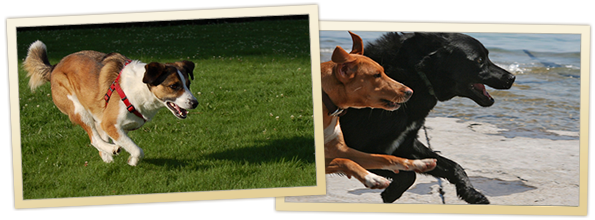Nature's Plan
Animal Planet

Training
Training your dog is part of being a responsible guardian, and the process of training your dog is a great bonding experience between you and your puppy. It's up to you to teach your dog to behave the way we humans want him to. Puppies as young as three weeks old can learn, as can adult dogs of any age.
A dog will learn best if he is rewarded immediately for his actions. An important ingredient in the learning process is attention - if the dog isn't paying attention to you, the lesson will not be successful. A tired or anxious dog will have more difficulty concentrating, and distractions also can interfere with learning. Beyond basic training, some dogs can learn to perform more elaborate tricks.
Socialization
A puppy can become very comfortable with children and the natural environment. The more experiences and adventures the puppy has at an early age, the more confident and reliable he will be in the future. You can introduce new situations, such as car rides, climbing stairs, busy streets, and meeting other dogs. The puppy? early weeks are the best time to expose him to as many different experiences as possible.
Crating
It is best to crate-train during puppyhood, and he will be more willingly to spend time in his private room. In fact, your puppy is likely to be very comfortable and content in the crate. Crate training will accustom him to having a quiet place of his own, where he can rest or play with his toys. It also allows you to keep him safe when you cannot be around to watch over him. On the down side, some puppies may experience separation anxiety and can seriously injure themselves during a severe panic attack.
Training Collar
A training (or choke) collar can injure your dog if worn or used incorrectly. Ask a trainer if a training collar is appropriate for your dog and have the trainer teach you how to use it. If your dog is a tenacious puller, consider using a head halter instead.
Training Tips
Be consistent. Use the same cue for the same command every time, and make sure everyone who's around your dog follows the same rules and uses the same cues.
Moderation is always better. Training works best if it's fun, so keep the mood upbeat and make the sessions short. Train slowly, starting in a quiet, familiar place with no distractions, and gradually make it more challenging for your dog. Don't progress to the next step until your dog has mastered the current one.
Reward for good behavior. Dogs learn better and faster when we praise and reward them for getting it right, rather than punishing them for getting it wrong. Once your dog gets the idea of what you're asking him to do, you can begin to reward him sporadically, so that he won? only work for food. Rewards can be also be physical, such as playing with him or a tummy rub. The praise and reward need to come immediately so that the dog can make the connection between good behavior and the reward.
Learn to adapt. Try and adapt your training to suit the dog. Your dog's behavior, not breed, is the best indicator of his personality. Although different dogs thrive on different training approaches, they all need a benevolent leader. Yelling, hitting, and other techniques that using pain or fear are never the solution - in fact they can create a behavior problem or make an existing problem worse. And remember, your dog can lose his new skills without regular practice, so keep practicing!
In This Section
Which Breed is Right for You?First Days
Puppy Care
Your Dog? Health
Training